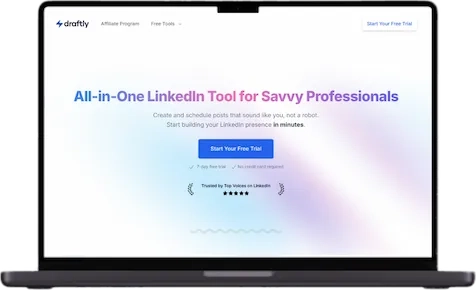How Much Does Your Healthcare App Development Cost? Everything You Need To Know
Healthcare apps have become an integral part of our modern lives, offering a convenient and accessible way to manage our health and well-being.
But with so many different types of healthcare apps available, it's natural to wonder about the cost of developing one.
Before we discuss the specifics of healthcare app development costs, let's define what we mean by a healthcare app.
While some people may associate healthcare apps solely with online consultation platforms, the reality is much broader.
Healthcare apps can encompass various functionalities, from tracking personal health metrics like heart rate and blood pressure to providing medication reminders, connecting with healthcare providers, and even offering virtual therapy sessions.
In this blog post, we'll explore the factors that influence the cost of healthcare app development, providing you with a clearer understanding of what to expect.
Who is this article for ?
Healthcare professionals (HCPs) seeking to create modern healthcare software solutions.
HealthTech startup founders aiming to solve long-standing industry challenges with new software products.
Healthcare provider institutions (hospitals, clinics, etc.) looking to improve patient care, streamline processes, or enhance data security.
Investors interested in understanding the healthcare app market and its potential for profitability.
The Growing Importance of Digital Investment in Healthcare
Recent insights from a McKinsey survey of 200 global health system executives reveal that digital investments are increasingly prioritized in healthcare. An impressive 72 percent of executives who have invested in digital priorities expressed satisfaction across all investment areas.
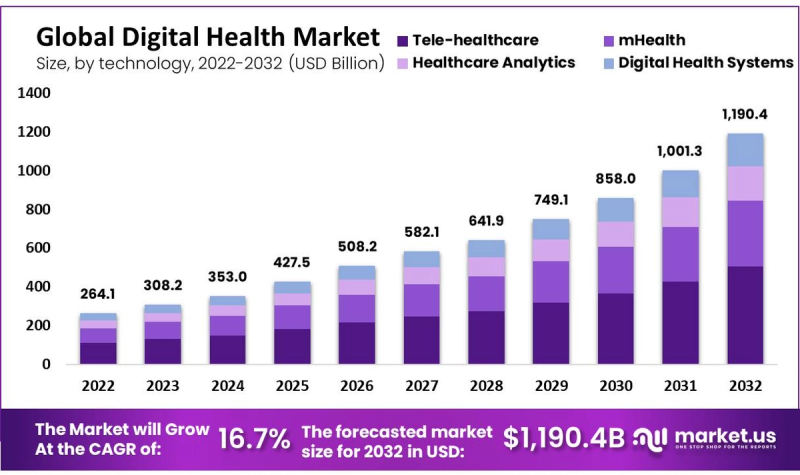
(Image Source: Market.us, Willis Towers Watson-2022, Rock Health, NCBI)
This trend underscores the significance of healthcare app development as part of broader digital strategies to enhance patient care and operational efficiency.
By focusing on healthcare app development, health systems can not only meet patient needs but also align with industry standards and expectations.
With a growing reliance on technology, understanding the healthcare app development cost becomes crucial for stakeholders looking to invest wisely.
The following section will explore the various factors influencing healthcare software development costs. This will help you make informed decisions when planning your app project.
Factors Influencing Healthcare Software Development Cost
1. Type of Healthcare App
As mentioned earlier, healthcare apps encompass a wide variety of types, each designed for different functionalities and user needs. The type of app you choose greatly affects the overall cost of development, whether it’s a mobile or web app.
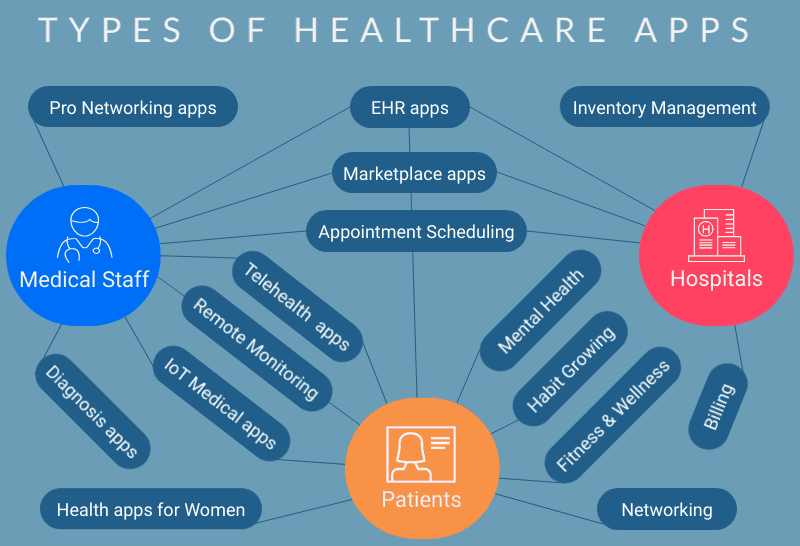
(Image Source: topfilghtapps.com)
Healthcare apps serve different user groups with unique needs.
They can be categorized into solutions for healthcare professionals (HCPs), apps for patients and users, and tools for hospitals.
Each category enhances health outcomes, streamlines processes, and supports the modern healthcare landscape.
1. Web/Mobile Apps for Healthcare Professionals (HCPs)
Pro Networking Apps
EHR Apps
Remote Monitoring Apps
Diagnosis Apps
Appointment Scheduling Apps
Billing Apps
Inventory Management Apps
2. Apps for Patients/Users
Telehealth Apps
Mental Health Apps
Habit-Tracking Apps
Fitness & Wellness Apps
Health Apps for Women
3. Apps for Hospitals
IoT Medical Apps
Marketplace Apps
Appointment Scheduling Apps
For instance, the telemedicine app development cost may differ significantly from that of fitness tracking apps due to their unique features.
2. Features and Functionalities
Features can range from simple appointment scheduling to advanced AI-based diagnostics.
Basic mobile apps may only need a few core features, while more sophisticated web or mobile apps might include integration with electronic health records (EHR) and payment systems.
Naturally, advanced features will increase the medical app development cost.
Key Features That Impact Costs
User Profiles and Authentication: Essential for all healthcare apps, whether web or mobile, but costs can vary based on the security measures implemented to protect sensitive information.
Video Consultation: Adds significantly to the telemedicine app development cost for both mobile and web apps. This feature requires reliable video streaming capabilities and secure communication tools to facilitate remote consultations effectively.
EHR Integration: Important for clinical applications, regardless of whether they are web or mobile, but requires additional security protocols to ensure compliance with healthcare regulations.
3. Platform Choice
The cost of developing a healthcare mobile app depends on whether it is designed solely as a web app or as a cross-platform mobile app that caters to both iOS and Android.
Developing for multiple platforms will increase the budget but ensure a broader audience reach.
4. Development Approach
When it comes to developing a healthcare app, you have two main paths to consider: off-the-shelf options and custom software development.
Let’s break down both options to find the best fit for you.
1. Off-the-Shelf Options (Ready Products/Solutions)
These are pre-built software solutions you can start using right away.
They come with lower initial costs, making them budget-friendly. However, while off-the-shelf options may seem budget-friendly at first, the total cost of ownership can increase as your needs evolve.
For example, if you just need a basic appointment app that simply schedules appointments, an off-the-shelf solution will do the trick. It’s quick to set up and usually costs less.
2. Custom Software Development
This involves tailored solutions designed to meet your organization’s unique needs.
While the upfront investment is higher, it often leads to long-term savings by improving efficiency and reducing operational costs.
If you want that appointment app to include features like patient reminders, integration with other systems, or a user-friendly interface tailored to your clinic's specific needs, custom software is the way to go.
Each approach has its strengths and costs, so it’s important to choose based on your organization’s needs.
Breakdown of Costs for Different Healthcare Apps
Understanding the costs associated with different types of healthcare apps is essential for effective budgeting and project planning.
Below is a breakdown of development costs for various healthcare app categories, highlighting their unique features and considerations.
Telemedicine App Development Cost
Telemedicine apps have gained popularity due to the rise in remote consultations. These mobile and web apps typically include features like video calls, real-time messaging, and patient records.
Because of the complex functionality, the cost of building a healthcare app in this category is usually higher.
To keep costs to a minimum, start with a minimum viable product (MVP) that includes only essential features like basic video calls and messaging, then gradually add advanced functionalities.
Cost Range: $40,000 - $250,000+
Fitness and Wellness Apps
These apps focus on general health and lifestyle rather than clinical data. They generally require fewer regulatory approvals, making them more affordable.
The cost of developing a health app for fitness tends to be lower due to simpler functionalities.
Cost Range: $15,000 - $100,000
Chronic Disease Management Apps
Such apps assist in monitoring conditions like diabetes or hypertension. They often require device integration, such as blood pressure monitors or glucose meters.
Cost Range: $25,000 - $800,000+
Appointment Scheduling Apps
Appointment scheduling apps simplify the booking process for patients and healthcare providers. Key features often include:
Real-time calendar availability
Automated reminders
Patient notifications
The cost of developing these apps can vary based on the complexity of the features.
Cost Range: $10,000 - $75,000
Health Records and EMR Apps
Health records and Electronic Medical Record (EMR) apps allow patients and providers to securely access and manage medical information. These apps need to ensure compliance with healthcare regulations, which can impact development costs.
Cost Range: $25,000 - $150,000+
Additional Factors Influencing Costs
The extra features and regulatory requirements push up the medical app development cost.
Key cost factors include:
Development Team: Rates can vary by location and expertise. Companies in regions with higher costs of living typically charge more.
Device Integration: Connecting with wearable devices or medical sensors adds to development time and testing.
Data Security and Compliance: Ensuring compliance with regulations like HIPAA requires advanced security features.
Custom Algorithms: Developing algorithms for data analysis and health monitoring can be resource-intensive.
User Interface (UI) Design: Creating a user-friendly interface tailored for chronic disease management adds design costs.
Regular Updates: Ongoing app updates to meet evolving regulatory standards and support new devices.
Hidden Costs: Unexpected expenses, such as licensing fees, third-party integrations, or post-launch marketing costs, can significantly impact the overall budget.
How Custom Healthcare Software Development Affects the Cost
Custom vs. Off-the-Shelf: Custom software is built specifically for your organization, providing unique functionalities and a better fit for your workflow, unlike generic software that may fail short in meeting specialized requirements.
Long-term Savings: Although custom apps may seem more expensive upfront, they can significantly reduce costs over time by streamlining operations, avoiding the limitations of one-size-fits-all solutions, and reducing dependency on multiple software tools.
Enhanced Security: Custom apps are designed to meet specific compliance requirements like HIPAA, significantly lowering security risks and ensuring data protection standards are met.
Opting for custom healthcare software development gives you control over every feature and design element.
This ensures the app aligns with specific needs and integrates smoothly with existing systems.
While custom solutions may be more expensive, they are a crucial investment since this field involves sensitive patient data and health.
Custom development not only allows healthcare organizations to build exactly what they need but also results in better performance, enhanced security, and greater adaptability.
In the long run, it can help boost profitability by optimizing operations and improving patient outcomes.
How Compliance and Security Standards Influence the Cost
Compliance with regulations like HIPAA is non-negotiable for healthcare apps. Implementing these standards adds to the cost of healthcare software development.
However, ensuring data security protects you and your organization against potential fines and reputation damage.
Regional Standards
HIPAA: Essential for apps dealing with patient data in the U.S.
GDPR: Adds costs for apps targeting European users.
Other Standards: Other Standards: Different regions have specific requirements, affecting development costs, such as PIPEDA (Canada) and PDPA (Singapore).
In-House Development vs. Outsourcing: Which is More Cost-Effective?
Comparing Different Outsourcing Models
| Outsourcing Model | Description | Pros | Cons |
|---|---|---|---|
| Freelance Developers | Individual developers hired for specific tasks or projects. | Lower cost for small projects. | May lack industry-specific expertise, limited availability for ongoing support and less accountability. |
| Custom Software Development Companies | Companies offer comprehensive development services tailored to client needs. | Provide industry expertise, scalability, and support. | Can be more expensive than freelancers. |
| In-House Development Team | A dedicated team within your organization that handles development internally. | Full control over the team and project. | Can attract more expenses due to lack of expertise. |
Software development companies are generally the most reliable for healthcare app projects. They offer specialized expertise and full custom healthcare software development services.
While freelancers may be cheaper, they pose risks with limited support. In-house teams provide control but often result in higher costs due to training needs.
Partnering with a development company ensures a smoother process and better long-term results.
Cost Estimation Based on App Development Stages
Developing a healthcare app is a multifaceted process that requires careful planning and execution.
From the initial stages of defining goals and features to the ongoing maintenance after launch, each phase plays a critical role in ensuring the app's success.
This overview outlines the key steps in the development journey, highlighting the associated costs and considerations at each stage.
By understanding these components, you can make informed decisions and effectively allocate resources to create a compliant, user-friendly healthcare solution.
1. Initial Planning
The initial phase involves defining the app's goals, features, and compliance needs. This can take 1-3 weeks and typically adds around 10-15% to the cost of developing a healthcare mobile or web app. Proper planning reduces errors in later stages, saving money. Additional costs during this phase may include compliance and regulatory fees, which ensure that the app meets necessary healthcare standards.
2. Wireframing
Design plays a key role in user experience and compliance with healthcare standards. Creating wireframes and interactive prototypes accounts for about 15-20% of the healthcare software development cost for both mobile and web platforms. A well-thought-out design can help prevent costly revisions during development. It is also essential to factor in hosting and server costs during this stage, as the app will need reliable infrastructure to operate effectively.
3. MVP Development
The development costs vary based on the app's complexity and platform choice—whether it’s a mobile app or a web app. This phase ensures the app meets all functional and regulatory requirements, adding another 20-30% to the total budget. Investing in rigorous testing can minimize unexpected costs after launch. It is important to remember that additional expenses, such as third-party integration and marketing efforts, may arise during this stage.
4. Maintenance
The app's release is not the final step; regular updates and bug fixes are essential for both mobile and web apps. Ongoing maintenance typically adds 10-20% annually to the initial cost of developing a healthcare app. These updates help keep the app compliant with evolving healthcare regulations. Additionally, you may need to budget for user training, app store fees, and a contingency fund to cover any unforeseen expenses that might arise.
How to Optimize Healthcare Software Development Cost
1. Prioritize Must-Have Features
Focus on the features that are essential for the app's core functionality. Avoid including too many advanced features initially, as they increase the healthcare app development cost. Additional functionalities can be introduced in future updates.
2. Consider a Minimum Viable Product (MVP)
Starting with an MVP allows you to launch the app quickly and gather user feedback. This approach reduces upfront development costs and helps in refining the app based on real user data. An MVP can serve as a cost-effective entry point into the market.
3. Choose the Right Development Partner
Working with a trusted medical software development company ensures a smoother development process. They can guide you on compliance requirements and cost-saving measures. Their experience in healthcare software development can help avoid unnecessary expenses.
Future Trends Impacting Healthcare App Development Cost
1. Integration of AI and Machine Learning
The Artificial Intelligence in Healthcare market reached a valuation of $19.68 billion in 2023 and is anticipated to grow at an impressive annual rate of 37.57%. By 2030, it could soar to approximately $183.56 billion.
AI technology is increasingly being embedded in healthcare applications, enhancing capabilities like diagnostics and predictive analytics. Although the integration of AI may increase the cost of custom healthcare software development, the long-term benefits in patient care are substantial.
As we look to the future, healthcare apps are set to become even more sophisticated, featuring a wider array of AI-driven functionalities that can transform patient outcomes.
2. Rise of Telehealth & Telemedicine
The COVID-19 pandemic accelerated the adoption of telehealth, and this trend is expected to continue. Future healthcare apps will need to include robust telehealth features to meet the ongoing demand for remote care and accessibility, enhancing convenience for patients.
3. Augmented Reality (AR)
AR is increasingly being used for training healthcare professionals and enhancing patient experiences. Implementing AR can significantly add to the development costs due to the complexity of creating immersive simulations.
Additionally, there are ongoing expenses for maintaining and updating AR features, ensuring they remain relevant and effective.
Despite these costs, AR can greatly improve learning outcomes and patient understanding, leading to reduced training time and better patient adherence over the long term.
4. The Cloud-Based Technology
Cloud computing is transforming healthcare app development by providing scalable storage solutions and enabling remote access to patient data.
While transitioning to cloud-based solutions can involve initial setup and ongoing subscription costs, it typically results in long-term savings through reduced infrastructure needs and improved collaboration among healthcare teams.
5. Focus on Patient-Centered Care
There is a growing emphasis on creating personalized experiences for patients. Developing apps that offer tailored health plans, reminders, and educational resources may require additional investment in user research and feature development.
However, these features can lead to higher patient engagement and adherence, ultimately benefiting the healthcare system financially.
6. Interoperability Solutions
There is a push for systems that can communicate with each other effectively.
Developing apps that can integrate with various healthcare systems and platforms may incur additional costs, but this investment enhances user experience and improves patient care continuity.
Over time, it can also reduce costs associated with data silos and improve efficiency.
How to Choose a Development Partner for Your Healthcare App Idea
Choosing the right development partner is key to bringing your healthcare app idea to life. Here’s a concise guide to help you make the best choice.
1. Define Your Needs
Set Clear Goals: Understand what you want your app to achieve, whether it’s telemedicine, fitness tracking, or patient management.
Identify Key Features: List must-have features like user authentication and appointment scheduling.
2. Research Partners
Look for Healthcare Expertise: Choose partners with a proven record in healthcare app development to ensure regulatory compliance.
Review Portfolios: Check past projects to see their design and functionality capabilities.
3. Evaluate Development Process
Agile Methodology: Ensure they use agile practices for flexibility and ongoing feedback.
Quality Assurance: Ask about their testing procedures to ensure the app is bug-free before launch.
4. Assess Communication
Open Communication: Choose a partner who is responsive and open to ideas, fostering collaboration.
Cultural Fit: Align values for better teamwork, especially under pressure.
5. Budget and Timeline
Request Detailed Quotes: Get estimates that outline costs, timelines, and deliverables.
Clarify Payment Terms: Understand their pricing model and any potential extra costs.
6. Consider Post-Launch Support
Ongoing Maintenance: Inquire about post-launch support for updates and improvements.
Feedback Incorporation: Ensure they can adapt based on user feedback.
The healthcare software development cost depends on many factors, including app type, features, and compliance requirements.
Choosing between in-house development and outsourcing also affects the overall budget.
Understanding these cost drivers can help you plan for a successful healthcare app project.
RaftLabs' Expertise in Building Bespoke Healthcare Applications
AI-Enhanced Remote Patient Monitoring Software
We developed an AI-driven remote patient monitoring app that automates data analysis from devices like continuous glucose monitors (CGMs) and blood pressure monitors (BPMs). This advancement has reduced clinical decision-making time by 20% for chronic care management.
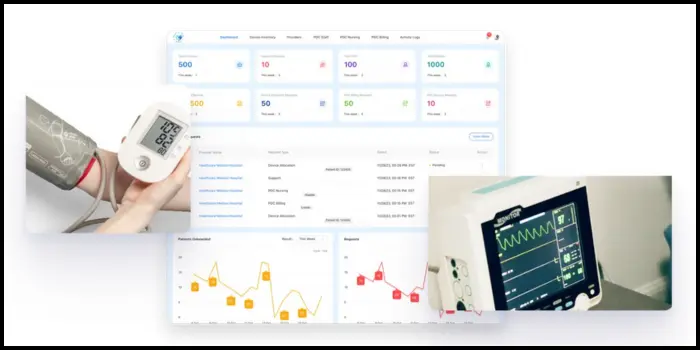
Telehealth App for Patient Access
We built a HIPAA-compliant telehealth app that has helped over 150 hospitals reduce ER visits by 60%. This web app, combined with FDA-approved diagnostic tools, enables physicians to deliver remote care anytime, anywhere.

RPM App for Senior Patients
We developed an RPM app that has been adopted by over 15 clinics, achieving 50% faster response times in just two months. It securely collects and transmits health data from CGMs and BPMs, streamlining remote care for providers.
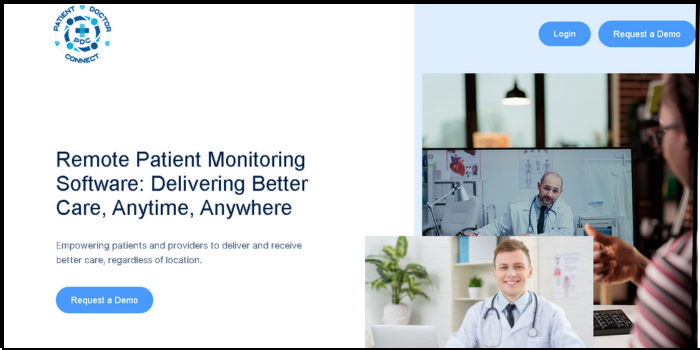
Bottom Line
Choosing the right partner for your healthcare app development can significantly impact your project's success, ensuring it not only meets compliance requirements but also delivers a seamless user experience. With so many options available, finding a partner that understands the complexities of the healthcare industry is crucial.
At RaftLabs, we bring years of experience in building secure, scalable, and user-friendly healthcare solutions that adhere to the latest standards. Our team works closely with you to understand your needs and deliver a solution that aligns with your vision to create the best app.
Contact us today to schedule a call with our experts and receive a customized quote for your healthcare app project. Let’s bring your vision to life together!
Frequently Asked Questions
What is healthcare app development?
Healthcare app development is the process of designing and creating mobile applications aimed at improving healthcare services and patient engagement. These applications can track medical data, provide virtual consultations, and offer educational resources.
Developers must be well-versed in HIPAA regulations and patient privacy laws to ensure that their applications are secure and compliant with industry standards.
What types of healthcare apps can be developed?
A diverse range of healthcare apps can enhance patient care and streamline healthcare management. Here are some popular types:
Telemedicine Apps: Enable virtual consultations with healthcare providers.
Health Records and EMR Apps: Allow patients and providers to manage medical records securely.
Fitness and Wellness Tracking Apps: Help users monitor health metrics and achieve fitness goals.
Medication Reminder Apps: Send reminders to users for taking medications on schedule.
Appointment Booking Apps: Facilitate easy scheduling and reminders for medical visits.
Symptom Checker Apps: Provide insights based on user-reported symptoms.
Mental Health and Wellness Apps: Offer tools for managing mental health and stress.
Chronic Disease Management Apps: Assist users in tracking symptoms and collaborating with healthcare providers.
These apps improve healthcare accessibility and empower users to take control of their health.
How do health apps make money?
Healthcare apps can generate revenue through several avenues, including:
Advertising Revenue: App developers can integrate ads that users click on, directing them to advertisers' websites.
In-App Purchases: Users can buy digital goods, such as premium content or additional features, directly within the app.
Subscriptions: Users pay a recurring fee for access to exclusive features and content unavailable in the free version.
By diversifying revenue streams, health apps can achieve greater financial sustainability.
How long does it take to develop a health app?
The development timeline for a healthcare app varies based on factors such as:
Size and Complexity: Larger, more complex apps naturally take longer to develop.
Experience Level of the Development Team: Experienced teams may streamline the process more efficiently.
Regulatory Requirements: Ensuring compliance with healthcare regulations can extend development time.
Depending on these factors, developing a web or mobile healthcare app can typically take 3-4 weeks to several months.
How do I create a healthcare application?
Creating a healthcare web or mobile app involves several key steps:
- Define the App Type: Identify the app's purpose and specific features it will offer.
- Target Audience: Determine your audience and strategize how to reach them effectively.
- User-Friendly Design: Create an intuitive, secure interface that meets the app's requirements.
- Functionality Verification: Thoroughly test the app to ensure accuracy and compliance with relevant regulations.
- Publishing: Launch the app on platforms like iOS and Android.
Following these steps helps ensure a successful launch and user experience.
Does healthcare app development have to be HIPAA compliant?
Yes, healthcare app development must adhere to HIPAA regulations if the app handles protected health information (PHI). HIPAA sets standards to protect sensitive patient data, and compliance requires implementing security measures like encryption, access controls, and audit trails. Failure to comply can lead to legal issues and damage your reputation, making it essential for developers to understand and integrate these guidelines when handling sensitive health information.
How do medical software developer charges impact project budgets?
Hiring a medical software development team significantly influences the overall budget for a healthcare software project. Understanding the hourly rates of developers, which vary by expertise and location, helps in making informed decisions and setting realistic financial expectations.
Why might healthcare custom software development incur additional fees?
Healthcare custom software development often incurs additional fees for features like compliance with HIPAA regulations, custom data security measures, and specialized integrations with medical devices.
What is healthcare software development cost in the US?
In the United States, healthcare software development costs can range significantly based on the complexity and type of the project. Generally, basic healthcare applications may start at around $50,000, while more complex systems, such as electronic health records (EHR) or telemedicine platforms, can cost anywhere from $150,000 to over $1 million. The overall cost is influenced by factors like the development team’s expertise, technology stack, and compliance with regulations such as HIPAA. At RaftLabs, we specialize in delivering tailored healthcare software solutions in the US, ensuring that your project meets industry standards and specific needs.
What factors influence the cost of healthcare app development?
The cost of healthcare app development is influenced by several factors, including the app's complexity, the number of features, the required integrations (e.g., EMRs), and compliance with regulations like HIPAA. These factors mirror similar cost considerations in loyalty program development, where the scope and customization directly affect the overall budget. Explore more insights in our guide on loyalty program development costs.
Insights from our team
Ready to build
something amazing?
With experience in product development across 24+ industries, share your plans,
and let's discuss the way forward.

